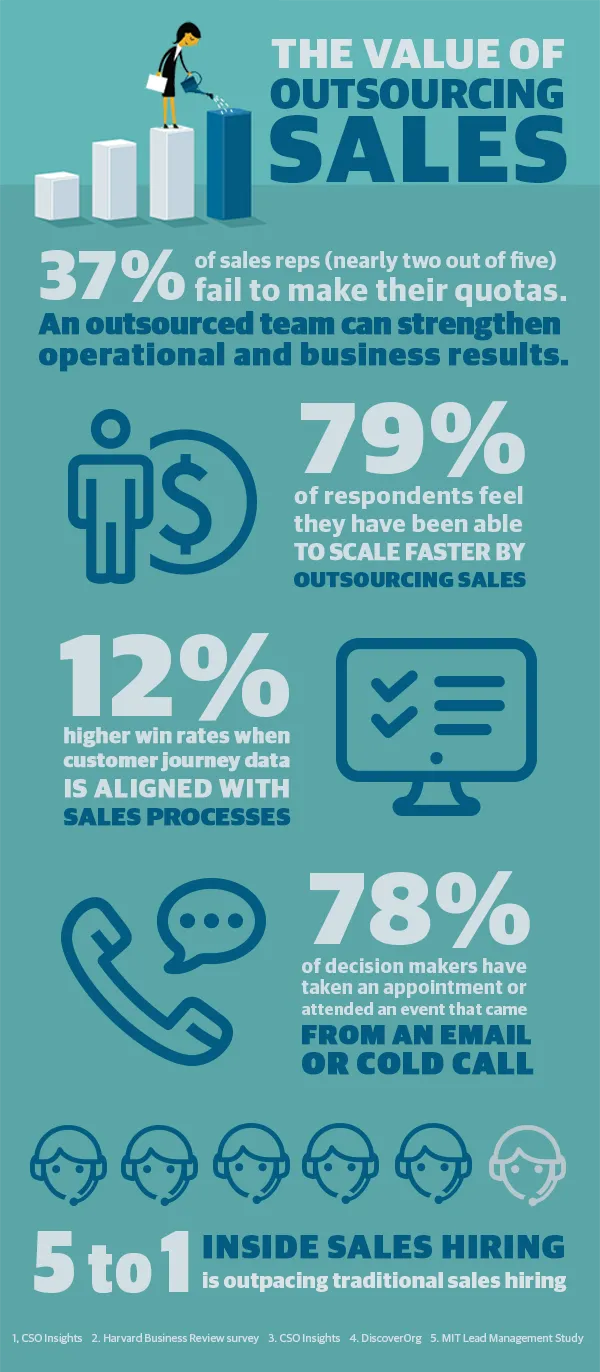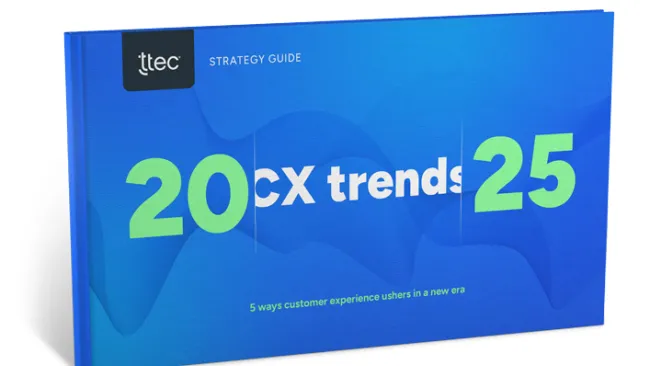What is sales outsourcing? Sales outsourcing allows you to take advantage of untapped opportunities by leveraging additional salespeople through an outsourcing partnership.
At a time when scalability, speed, and focus are essential, outsourcing sales is a proven way for companies to quickly and effectively drive revenue. Sales outsourcing enables companies to take advantage of untapped opportunities by leveraging skilled salespeople and other experts. Working with forward-thinking partners and experts also enables organizations to take advantage of the latest outsourcing trends such as increased cyber security measures, using predictive models to gain market share, improving cost efficiencies, developing short- and long-term digital transformation strategies, and partnering with companies that share the same social values
From a sales perspective, outsourcing sales can help you target new or underserved markets, support new product and service rollouts, and provide expertise within a specific industry focus. From an operational standpoint, a sales outsourcing company can help you leapfrog technology constraints and break out of silos within your own organization, all while allowing your company to focus on its core competencies.
However, despite the fact that it is a great opportunity to augment your sales team, reach new target markets, and grow your business, many organizational decision makers are often reluctant to outsource any of their sales functions. Relinquishing any control over an aspect of the sales process can be tough. Even more so when sales leaders are on the hook for hitting performance goals.
In other cases, there’s a fear of the unknown. Business leaders, for example, have a hard time envisioning another sales company representing their brand well in order to build and maintain strong customer relationships. Leadership feels they need to manage and control the customer experience. Yet despite these concerns, there are numerous business and operational advantages to outsourcing sales activities to a dedicated team.
Outsourcing sales in healthcare, for example, can give companies a competitive edge. Healthcare sales outsourcing helps healthcare businesses tap into a highly skilled labor pool that’s trained in delivering seamless, empathetic support to customers. Teams of sales representatives can ramp quickly to meet seasonal surge needs (like during open enrollment) to improve member experience, grow efficiencies, and drive revenue.
In the article below, we illustrate key data points showing the value of sales outsourcing services, provide an overview of 11 benefits sales outsourcing companies can deliver, and outline a five-step approach in creating a roadmap to optimize sales growth and your sales pipeline. We also provide additional resources for you to explore the topic of outsourcing sales teams in further detail.
Benefits of outsourcing sales infographic

This infographic shows some of the benefits of outsourcing sales. Based on research findings, in a traditional sales team, many sales reps (37%, or nearly two out of five), fail to make their quotas. On the other hand, of the companies surveyed that utilize sales outsourcing services, 79% feel they have been able to scale faster as a result. Similarly, 78% of decision makers have taken an appointment or attended an event that came from an email or cold call. This is a great example of one of the reasons to outsource sales prospecting. A highly specialized inside sales team, with a sales outsourcing industry focus, product focus, or region specific focus, can provide much more extensive outreach than a company could hope to accomplish on their own. Also, sales operations outsourcing brings with it more than just the sales team, as technical infrastructure and expertise, particularly in customer and data analytics, is another key benefit. This is particularly helpful in driving sales results, as research shows customer journey data aligned with sales processes can lead to 12% higher win rates.
What outsourcing sales can do for your company
Buyers have access to more information than ever. Knowledgeable sales agents can help cut through the noise, answer perspective customers' questions and help guide the buyer's journey.
Also, many sales organizations struggle to increase lead generation, improve conversion rates of qualified leads, and shorten protracted sales cycles. Along with a lack of product or vertical industry expertise within the sales organization, these constraints hurt overall sales execution. Consider that nearly two out of five (37 percent) sales reps fail to make their quotas, according to CSO Insights. While there are numerous reasons for these shortcomings, the bottom line is that an outsourced team can help strengthen operational and business results.
In our experience, there are 11 main ways sales outsourcing can help transform your business. In this article, we outline the 11 benefits of outsourcing sales, the importance of creating a clear sales roadmap to achieve your sales goals, and highlight some survey results.
1. Sales outsourcing can help you target new or underserved markets
Small businesses, mid-market, and even enterprise companies are often stretched when it comes to having enough salespeople to cover different territories and industries. In addition, companies often have numerous business leads available to them that they’re unable to pursue due to resource constraints.
As part of your long term market strategy, an outsourced sales agency can focus on developing specific vertical or geographic markets. Meanwhile, companies can also use an outsourced sales team to test new approaches to sales and product positioning. From there, advanced sales analytics and speech analytics can help fine-tune your marketing before being extended to a larger base of customers and potential customers.
2. Outsourcing sales operations can help you leapfrog technology constraints
Investing in the latest tools is one thing. Having the knowledge and expertise to leverage those tools is another. It’s not just about having the tools, it’s about knowing how to get the most value out of them. That's why you need sales professionals who are experts at cutting edge sales and analytics tools.
Companies can save time and achieve time-to-market benefits by outsourcing to a partner with state-of-the-art data and technology environments. For example, companies can benefit from the use of an outsourced partner’s analytics tools. Data analytics can provide salespeople many insights, such as the best time to call a customer or to extend an offer. Also, artificial intelligence combined with analytics can help sales leaders analyze thousands of data points. This, in turn, provides a deeper understanding of prospect needs.
3. A sales outsourcing business model can help you break out of silos
The reality is many teams operate in a silo. Most internal sales teams, for instance, don’t regularly collaborate with marketing or other departments. Additionally, each team may not approach issues holistically and instead maintains a laser focus on departmental tasks. Outsourcing sales often helps companies manage to outcomes in a more direct way. An external team is better positioned to work cross-functionally within an organization, to improve the overall sales execution. An outsourcer may also be able to work with shorter timeframes that are difficult to accomplish internally.
4. Outsourcing sales and marketing can help support new product or service rollouts
One advantage to outsourcing sales is to leverage the outsourcing company as a sandbox to test out new campaigns and promotions.
For example, a technology company partnered with us to call customers and prospects about new products it’s testing. The company then analyzes the results and feedback to determine whether to launch the product into the market or make revisions. In some cases, we help to assess how a product is being received in the market. This helps determine an effective price point and what the sales cycle is going to look like for that product.
5. Sales outsourcing services can improve omnichannel customer engagement
Organizations that tap into the expertise of sales reps with proven performance in digital channels such as web, chat, and social will strengthen their omnichannel results.
Meanwhile, many sales leaders are just beginning to recognize the engagement opportunities that messaging and chat can create with customers and prospects. Companies that lean on outsourced partners with proven digital engagement skills among their sales reps can achieve dramatic results in improving unit volume and Net Promoter Score (NPS) by connecting with customers who prefer to use chat.
6. A sales outsourcing team can provide expertise
Leveraging a sales outsourcing solution can enable a company to draw on best practices and lessons learned from a partner’s vast experience with other clients across multiple industries. This is extremely useful for picking up new ideas for sales techniques, especially for companies in industries that are rather insular. It’s also a great way for sales leaders to add bench strength with reps who have demonstrated experience in specific vertical industries (e.g., healthcare, financial services, technology).
7. Outsourcing lowers the cost of sales
Inside sales teams are less expensive than onboarding and staffing field sales staff. Industry estimates reveal that each customer contact with an inside salesperson might cost a company $25 to $30 compared with $300 to $500 for a field salesperson, including travel expenses and company benefits. But companies who have historically invested in field sales staff might not be prepared to build and manage a robust inside sales team. Outsourcing the inside sales function enables sales leaders to slash overhead costs while expanding sales coverage.
8. An outsourcing sales business model provides greater accountability, analysis, and dependable performance management
Outsourcers are typically paid on a success-fee basis. The conditions of payment largely depend on whether the outsourcer successfully closes deals with new clients. As such, outsourcers are incentivized to take greater accountability for the sales process and well positioned to bring forward new ideas that will continuously improve the results of their sales efforts. Outsourcers must also meet contractual service level agreements and expectations, which give them “skin in the game.”
9. Outsourcing sales can help promote greater performance
An outsourced sales organization can spur internal teams to ramp up their operations. Adding an outsourced sales partner to work alongside an internal team provides an external benchmark for high quality performance that can help raise the level across the board. An outsourcer also brings fresh ideas, new perspectives, and best practices to the table. For example, sales organizations that need to make substantive changes, such as an overhaul to its sales strategy or the implementation of a digital marketing plan, can gain from working with a third-party provider that can offer innovative suggestions based on practical experience with other clients.
10. Outsourcing sales operations lets you leveraging data insights to increase profits and revenues
Companies can maximize all sales opportunities and increase revenue by leveraging an outsourcer’s data insights platform. Customer data and analytics can help create statistical models that can be used to identify the best customers and prospects along with developing an effective touch cadence throughout the customer lifecycle. If you would like to explore the data analytics benefits of outsourcing sales in more detail, please download our strategy guide, 7 Steps to Integrate B2B Sales and Marketing With Data or visit our Growth Analytics page.
11. Collaborating with a partner that becomes an extension of your brand.
Outsourcing gives companies a huge competitive advantage because if done right, it allows them to scale successfully with resources that align to their company culture, social values, and collaborative process. By expanding their team with a partner that is laser-focused on customer experience, companies add new capabilities, skillsets, and specialized expertise on how to deliver CX that satisfies. It also allows a company to support increased volumes of outbound prospecting and inbound lead qualifying. For example, when working with a new client, we focus on understanding the company’s culture, social values, and mission in order to create an open dialogue about current goals and tomorrow’s ambitions to drive ongoing success.
A sales team also needs a clear roadmap for its sales efforts and marketing plan
Today’s cutthroat market is putting increased pressure on sales and marketing teams to increase sales volumes and achieve growth. Being successful requires more than just a strong sales team. Organizations need to have a clear roadmap that helps them get the desired results. Our Customer Acquisition Services team believes in the following five-step approach to optimize sales growth:
1. Develop a clearly focused and executable strategy. Many companies have problems developing sales programs and strategies that are aimed at the right customer segments. Therefore, business leaders need to first leverage data to understand customers’ needs. Only then can they determine which segments should be treated with which products or services.
2. Develop feasible processes. In order to attract and engage customers, organizations need to have executable processes. We often meet executives who complain that their organization’s sales processes are outdated. Increasing the problem, their inefficient processes make it difficult to meet the changing demands of customers and the market. Rather than tackling the entire process problem in one go, we recommend focusing on a single process first. For example, a process related to a particular geography or customer segment or product.
3. Select the right tools. Business leaders need to evaluate technologies used to support the sales process and determine which ones are, and are not, working. This insight will allow organizations to identify gaps and time consuming inefficiencies within the sales process and determine what other technologies are needed to optimize.
4. Ensure the right execution. Having the right tools is just the start. You need to know how to use them to be successful in helping the sales organization reach its objectives. We recommend evaluating the organization’s objectives and assessing the readiness of the tools and processes to achieve these goals.
5. Encourage an adaptable culture. The right business culture is essential for organizations. To quote management expert Peter Drucker, “culture eats strategy for breakfast.” Business leaders who think they can be successful simply by having a robust strategy are wrong.
How do you get started with outsourcing sales?
A good starting point for exploring the advantages of working with an outsourcer is to have a prospective partner conduct an assessment to help identify gaps in your sales processes and opportunities for improvement. Sales leaders can also benefit by identifying and selecting a geography or customer segment that is underserved and start there.
When evaluating potential outsourcing partners, make sure that the philosophy of the partner that’s ultimately selected is closely aligned with your organization’s culture. Will the salespeople be taught the language or key terms to use with your customers and prospects, as well as obtain a deep understanding of your product positioning and messaging?
Simply put, to find the right sales outsourcing vendor you have to ask the right questions. That's why we've created a free starter list of sample questions to ask potential sales outsourcing providers. The ready-to-use template provides an overview of key topics and questions to ask potential vendors to ensure they match your sales vision and strategic goals.
Some of the key topics outlined are ROI questions related to what defines success, including topics related to goals and objectives, as well as detailed questions about ROI and pricing models. Also included are data and technology questions about infrastructure, security, systems integration, and tech compatibility, and project management questions about partner collaboration and support staff team commitments. Overall, our starter template provides a quick way to uncover the strengths and weaknesses of potential sales outsourcing partners.
We hope you enjoyed this article and it provided you a view into the many benefits of outsourcing sales. Hopefully our sales optimization roadmap best practices and outsourcing request for proposal starter list of questions have also sparked some ideas for next steps to help you explore whether a sales outsourcing business model is right for your business. This article touched on the many benefits of outsourcing sales. To explore these 11 advantages in more detail, as well as to see real world results and client success stories, download the full Inside Sales Outsourcing Best Practices guide to learn more about the latest sales outsourcing trends to help keep your business agile and innovative.
More information about TTEC and our sales outsourcing services
If you would like to learn more about why TTEC is one of the best sales outsourcing companies, please explore our entire Customer Acquisition as a Service offerings, including new customer acquisition, service to sales, and customer retention and loyalty solutions, all powered by advanced growth analytics.
In the below video, learn more about our sales methodology and services.



















